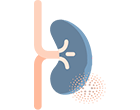Cunha, T., & Heilberg, I. P. (2018). Bartter syndrome: causes, diagnosis, and treatment. International journal of nephrology and renovascular disease, 11, 291–301. https://doi.org/10.2147/IJNRD.S155397
Bao, M., Cai, J., Yang, X., & Ma, W. (2019). Genetic screening for Bartter syndrome and Gitelman syndrome pathogenic genes among individuals with hypertension and hypokalemia. Clinical and experimental hypertension (New York, N.Y. : 1993), 41(4), 381–388. https://doi.org/10.1080/10641963.2018.1489547
Mrad, F., Soares, S., de Menezes Silva, L., Dos Anjos Menezes, P. V., & Simões-E-Silva, A. C. (2021). Bartter’s syndrome: clinical findings, genetic causes and therapeutic approach. World journal of pediatrics : WJP, 17(1), 31–39. https://doi.org/10.1007/s12519-020-00370-4
Cunha, T., & Heilberg, I. (2018). Bartter syndrome: causes, diagnosis, and treatment. International Journal Of Nephrology And Renovascular Disease, Volume 11, 291-301. doi: 10.2147/ijnrd.s155397
Seys, E., Andrini, O., Keck, M., Mansour-Hendili, L., Courand, P., & Simian, C. et al. (2017). Clinical and Genetic Spectrum of Bartter Syndrome Type 3. Journal Of The American Society Of Nephrology, 28(8), 2540-2552. doi: 10.1681/asn.2016101057
Daniluk, U., Kaczmarski, M., Wasilewska, J., Matuszewska, E., Semeniuk, J., Sidor, K., & Krasnow, A. (2004). Zespól Barttera [Bartter’s syndrome]. Polski merkuriusz lekarski : organ Polskiego Towarzystwa Lekarskiego, 16(95), 484–489.






